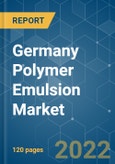The Germany polymer emulsion market is estimated to witness a healthy growth, at an estimated CAGR of over 5%, over the forecast period. The major factor driving the growth of the market studied is growing awareness with regard to volatile organic compound (VOC).
Key Highlights
- Availability of substitutes and decreasing demand in off-shore applications are likely to hinder the markets growth.
- Increasing research on water-based paints in anti-corrosive applications is likely to create opportunities for the market in the coming years.
Key Market Trends
Vinyl Acetate - the Fastest Growing Segment
- Vinyl acetate is expected to be the fastest growing segment on account to growing applications in end-user industries, such as building and construction, automotive, etc.
- In buildings and construction end-user segment, it is increasingly used in architectural paints and coatings because of its aesthetic appeal and high resistance to temperatures.
- In addition, the growing building and construction sector due to the increased construction spending in non-residential sector is providing opportunities for the market.
- According to industry experts, the demand for new houses is estimated to be around 350,000 per year until 2020, which is expected to boost the construction sector. The non-residential and commercial buildings in the country are expected to witness significant growth prospects during the forecast period. The growth is supported by lower interest rates, increase in real disposable incomes, and numerous investments by the European Union and the German Government.
- It is also expected that Germany may spend more on the public infrastructure, and an increase in investments through public-private partnerships at the municipal level.
- Owing to all these factors, the demand for polymer emulsions in the country is expected to increase during the forecast period.
Increasing Demand from Paints and Coatings
- Paints and coatings are extensively used in the architectural sector for both, exterior and interior applications. Acrylic, vinyl acrylic, styrene acrylic, and vinyl acetate ethylene copolymer latex are the major emulsion polymers used in such paints and coatings.
- In the building and construction industry, emulsion polymers are used in the manufacturing process of architectural paints, high scrub interior paints, exterior paints for high durability and wet adhesion, deck and trim paints, and stains and elastomeric coatings. Paints and coatings are applied on exterior of the house to not only give them a new look, but also protect it from blistering summers, freezing winters, soaking rain, and the daily bombardment of UV radiation, without fading, peeling away, and cracking.
- Additionally, paints and coatings are used in interiors of houses to add colors or decorative purposes, along with a wide range of other functions. Their functions vary, depending upon the type of environment and room that they are used on.
- For example, due to the moisture, bathroom walls need to have wipe-ability for keeping them clean. Paints with glossier sheens have a tighter molecular structure than flat paints, making it more difficult for moisture to penetrate. Hence, these types of paints are used in bathroom.
- Thus, the market for polymer emulsions is projected to grow during the forecast period.
Competitive Landscape
The Germany polymer emulsion market is a fragmented market, where numerous players account for insignificant share to influence the market demand, individually. Some of the noticeable players in the market include Akzo Nobel N.V., Arkema Group, BASF SE, Clariant, and Dow, amongst others.
Additional Benefits:
- The market estimate (ME) sheet in Excel format
- 3 months of analyst support
This product will be delivered within 2 business days.
Table of Contents
Methodology

LOADING...








